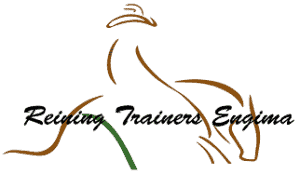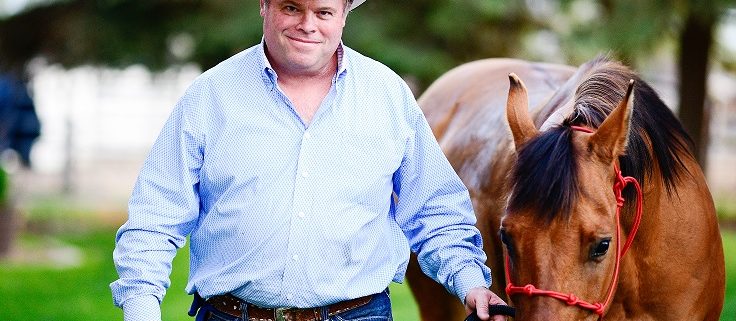Professional Reining Trainer is Looking for His Next Meal
So, you’ve decided to get a reining horse. You have seen the glossy images of horses sliding and those stud horse advertisements. You visited some shows, and wow you are in. You have been told it’s the greatest sport on earth and you want to be part of it. You have heard all about the futurity, and that seems to be the conversation all the trainers want to have. There are horses advertised for sale but its hard to know where to start. Your friends all start advising which trainer is the one to use and what a great fella he/she is too.
So, the first thing that becomes obvious is you need to get a professional reining trainer. Rarely does anyone take on being in reining without a trainer nowadays. These animals require specialized schooling, training surfaces, shoeing if you want to be competitive at even the lowest levels. You also need assistance in finding the right horse – a sound one if that is possible.
You are about to potentially pay $20,000 – $50,000 – $100,000 or whatever sum over to a person that could do whatever they want with your investment or passion and leave you with nothing.
What to know about trainers
From this moment forward is when fools can part with a lot of money only and end up with a broken down, out of fashion horse that is of no value. Trainers have a unique way of dealing with their clients. Many operate on the basis of how much money can they drain from your pocket in pursuit of their personal goal. They want to win a futurity and the owners fund them.
It is much like a pyramid, those at the top get the pick of the crop of clients and horses. They rule the world and convey the view you cannot live without them. They have all the salesmanship of a professional car salesman and operate in an industry with no rules or regulations on how they treat and manage horses and clients outside of the show pen. There is some waffly piece of paper called the NRHA Code of Ethics, but that has as much value as a piece of toilet paper. The NRHA print it, but they do not stand by it in any form. The top trainers can churn and burn clients, and no-one cares what happens to the client or the horse. They have a nickname for all the clients “Next.”
The lower ranked trainers have their own special kind of story. They have learned how to keep horses in barns for a longer period of time, so they feed their families each week. They don’t have the prize money to live off, so they are a good salesman. It’s a survival skill they learn early in the business. They are always on the lookout for what is referred to in the industry as the ‘dinner plate horse.’ An owner that is excited about having a horse in the futurity and dumb enough not to question what is going on. They also come with a healthy bank balance that will hold together for two years.
Then there are those trainers just starting out that talk of great feats of ability as a non-pro and now hang out his or her shingle and proclaim, “Today, I’m a professional horse trainer.” They don’t like working nine to five and decide that a life of training horses is the way to go. Do what you love is what the guru’s tell people to do. They have little experience in managing horses outside of their own, low levels of veterinary knowledge and certainly have not been astride enough horses to add real value to the process. Their fees are a little lighter, but so is the feed bucket the horse will get. They are usually cutting corners on everything, including your horse’s welfare, to keep the lights on in their house.
As recently cited in an article by Rick Dennis “However and for the record, there are a lot of really good horse trainers out there; however, the corrupt, immoral, fraudulent and imbecilic individuals operating within the industry, as well as the ones causing the abhorrent abuses and fraudulent activities, are unfairly stigmatizing the honorable ones. For the record, not all horse trainers are created equally or share the same moralistic values of trust, duty of loyalty, honor and country.”
Isn’t funny that everyone seems to be meeting many of the bad ones and not too many of the good ones these days.
Did you know that thousands of horses are started for the futurity each year? It’s the business of the NRHA – a futurity. Look at the entries that made it through to the event, and the least heard the excuse for a horse not being there is the client ran out of money. Most horses have broken down mentally or physically in the training regime of drilling them numb to complete a reining pattern.
Are references the answer?
People say, to get references before picking a trainer. But here’s the thing. The biggest thing you will possibly learn about is the reining horse business.
The top trainers have another little skill that no one new to the industry knows about. The skill of hiding their skeletons and being rid of the evidence. The lesser trainers have the same skill but often not the expertise and political power. The one thing that is standing out to Reining Trainer Engima now is how many people have a civil action against top trainers, and other lesser trainers, for abuse of their horses and welfare problems. Horrific tales of what happened to their animals and the common fact is they, the client, are now exiled from the reining horse industry. To participate in reining, you have to accept the horses are wastage or you’re out on your ear. For people that have a passion for horses and a touch of kindness in their soul, it’s a hard lesson to learn from the suffering of your horse.
Those reporting to RTE their experiences often sought support from the NRHA only to be told it’s not in the rule book so move on. They have a lawyer on a retainer to manage those squeaky wheels called owners. The NRHA ignores what happens outside of the pen, even though one day they decided to publish their Code of Ethics. You have to wonder what their intention was.
Another lesson for today
To the newcomer or the unsocialized owner, they would be unaware of the issues in a specific training barn as huge prize money means trainers cannot be questioned – the client is always wrong and just a troublemaker or stupid. No other industry would have such arrogance but reining (and other horse disciplines) prize money brings immunity. This makes reference checking hard, so most people learn through their pockets as they are lured by the salesman.
Back to the purchasing of a horse. Trainers make good money on sales commissions of horses so they can always fit you out with a horse or two or three. They will tell you romantic stories of its breeding and lure you into writing out a nice check.
You finally settle on a horse and after many x-rays and disappointments of failing vet checks (hopefully, you got x-rays) you find your new dream. In fact, the trainer helped you find two. One for you to ride and one for them to take to the futurity – what a great guy/gal.
If you have gone and purchased your own horse and want it trained, just make sure of the following:
- Do not put a horse that is not bred by the trainer’s stallion (or tops client stallion) as it will rarely make it. They support their own stock first.
- Make sure the person can get along with a mare/stallion/gelding. Some trainers cannot work with some genders.
- Be aware that other top clients (ones they have romanced for some time) will always get the winning ride. It’s a loyalty thing – intentional or not. Their horse always gets that extra bit of care.
- If the trainer does not get excited about your bloodline – step away immediately. Don’t try and convince them and don’t let them give it a go. Many people report of trainers taking their money only to turn around and say ‘gee I hated that horse’ or ‘I knew that bloodline was useless.’ Nice bit of information to find out after you load it up on the trailer.
What else could possibly go wrong?
You start on the journey, and the expectations are set of what the horse can potentially do. Herein lies the trap.
- How do you know if your horse is a dinner plate horse?
- Is the trainer really riding the horse or is one of the sidekicks on it?
- Is the horse being properly cared for with the right amount of food, clean stable, turn-out time and rugging?
- Is the horse stressing being in training, but you are not being told? Does the trainer even like the horse or is it last out to work, if it’s not too late that day.
- Is your horse spending seven days in a stall and working only every couple of days?
You can make regular visits to the barn but that is usually at a set time, and you get a stage show put on every time you visit. Unless you’re an experienced horseman yourself, with good knowledge of welfare and training methods, you can be quickly bamboozled. Remember: they are professional at doing stage shows to clients, they do them all the time. So, don’t think you can catch them out easily. These salesmen have burned some of the best breeders and owners.
Make unannounced visits to the barn during the week. If the trainer does not like it, then bring your trailer. He is in a business that should be working horses daily. Don’t expect the trainer to drop everything and cater to you, but hang around and watch what is happening with all the horses. Stay around at feed time and offer to help. Gosh, the day you visit you may even get to see your horse worked and found it in a stall not tied to a tree out the back.
If you are in doubt your horse is not being cared for or suspect you are being led up the path; you can pretty much be sure it is happening. Don’t trust them, don’t believe their stories, verify everything and ensure you regularly visit your horse to oversee its welfare. Good Luck and remember the NRHA is not there for you.
To solve this problem, the NRHA needs to be made accountable or remove their Code of Ethics. Please vote for change. Now Closed
© 2018 Reining Trainers.com. All Rights Reserved

